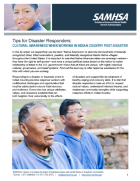This tip sheet is a revised/updated document discussing Historical trauma in Indian Country.
Dashboard: Filter Bricks
Main page content


This tip sheet is a revised/updated document discussing Cultural Awareness working post disaster in Indian Country.

This guide focuses on research supporting adaptations of evidence-based practices (EBPs) for under-resourced populations. Adaptations involve tailoring care, programs, and services to the cultural, social, gender, and demographic contexts of the people served to yield positive outcomes.

This report provides findings from a qualitative analysis of evidence-based and culturally relevant behavioral health practices offered at NNEDLearn, a SAMHSA training, offered from 2011 to 2020. It includes an overview of NNEDLearn, case studies, strategies and lessons learned, and conclusion.

This brochure provides an overview of the Sequential Intercept Model (SIM). The SIM is a strategic planning tool that helps communities better understand the gaps and resources they have in helping those with mental illness or substance use disorders who are in the criminal justice system.

This manual provides a starting place for jurisdictions looking to use data to better understand and improve the outcomes of people with mental and/or substance use disorders who come into contact with the criminal justice system.

TIP 61 provides behavioral health professionals with practical guidance about Native American history, historical trauma, and critical cultural perspectives in their work with American Indian and Alaska Native clients. The TIP discusses the demographics, social challenges, and behavioral health concerns of Native Americans. It highlights the importance of providers’ cultural awareness, cultural competence, and culture-specific knowledge. The TIP also helps administrators, program managers, and clinical supervisors foster a culturally responsive environment for American Indian and Alaska Native clients. Specific topic areas include workforce development strategies, program and professional development considerations, and culturally responsive policies and procedures.

This 2016 report provides an overview of data from the Comprehensive Community Mental Health Services for Children with Serious Emotional Disturbances program. It presents findings that indicate that systems of care provide services and promote positive outcomes for underserved children and youth within the mental health system.

This report highlights existing programs that address behavioral health disparities among Asian American, Native Hawaiian, and Pacific Islander boys and young men. It also outlines effective tools and best practices in working with this population.

The SAMHSA Spotlight Series highlights different approaches to building trauma-informed, resilient communities. This introductory issue present's SAMHSA's six principles of trauma-informed approach, and summarizes SAMHSA's community trauma initiative.
Displaying 1 - 10 out of 38

